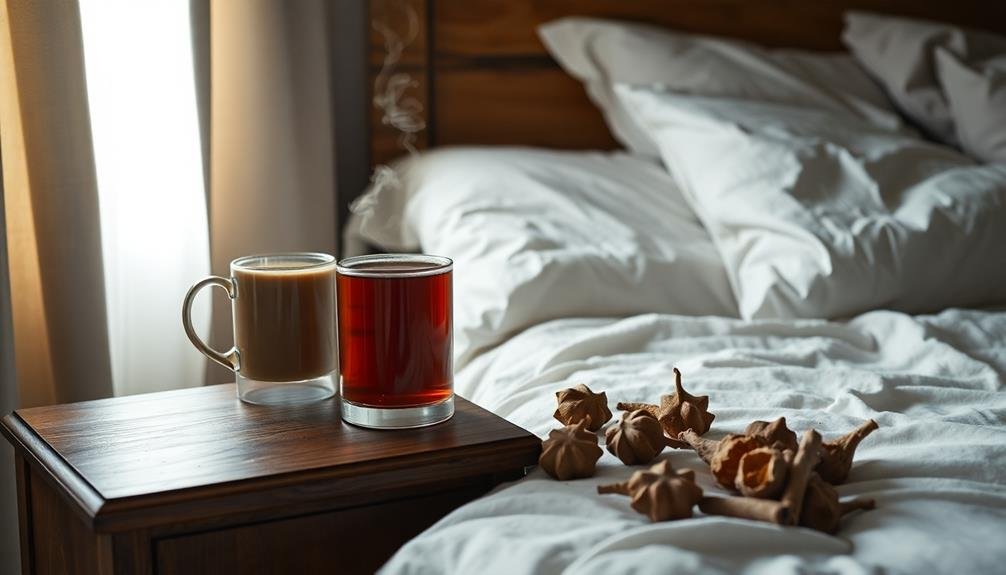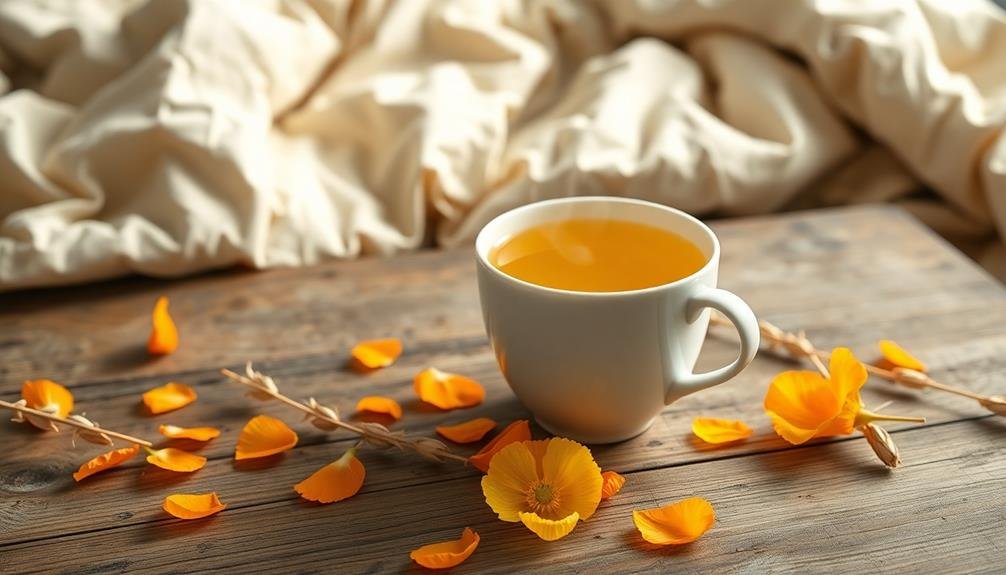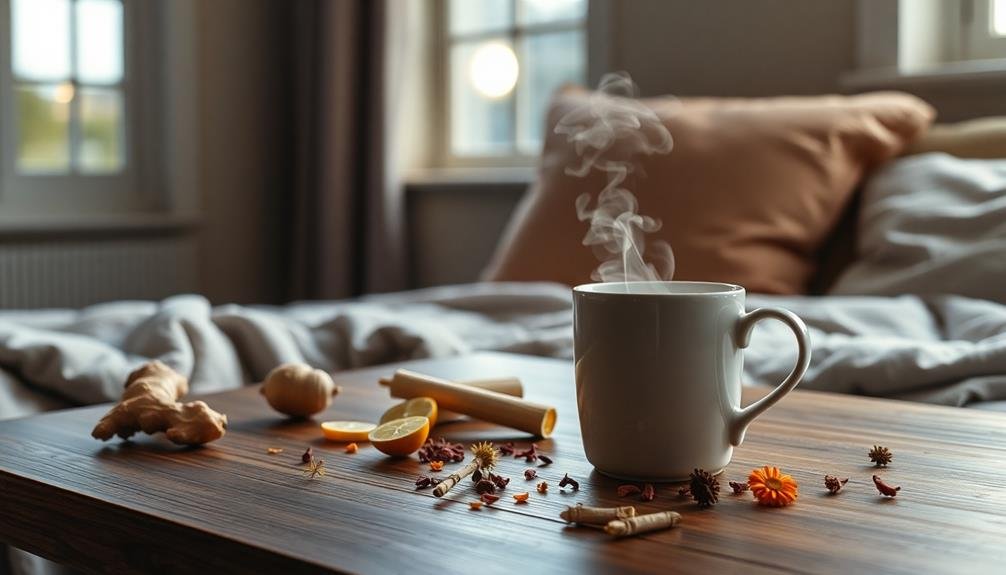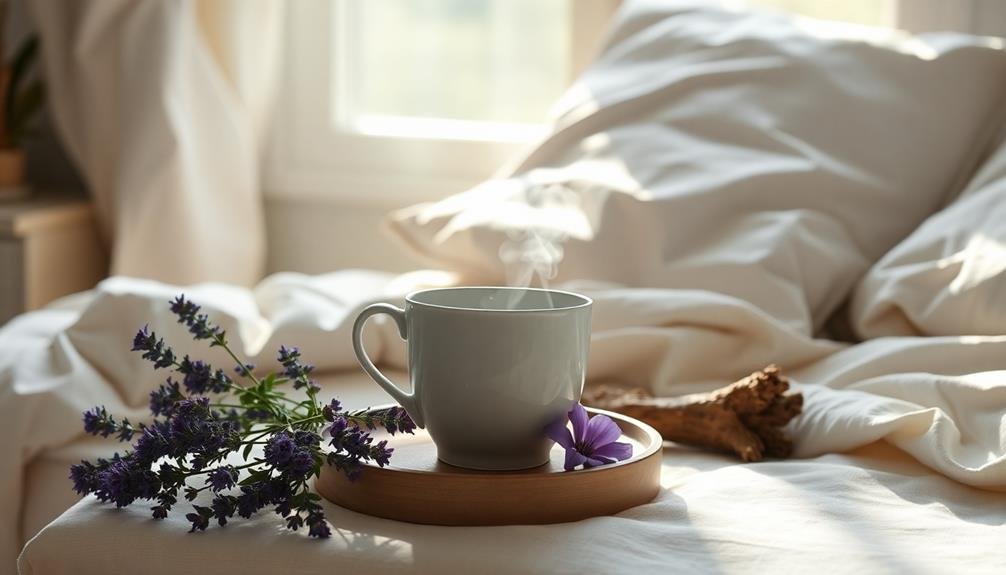Several herbal tea blends can help you sleep better. Chamomile and lavender blend offers mild sedative effects, while valerian root tea mix improves sleep quality. Passionflower and lemon balm infusion increases GABA levels for relaxation. Peppermint and catnip combination aids digestion and promotes calmness. Magnolia bark sleep elixir acts as a natural sedative. Other effective blends include holy basil with linden flower, California poppy with oat straw, and kava kava with licorice root. Ginger and lemongrass can also create a soothing sleepytime blend. Each blend offers unique benefits, and exploring their properties can help you find your perfect sleep-inducing tea.
Chamomile and Lavender Blend

Why not combine two of nature's most soothing herbs? Chamomile and lavender create a powerful blend that can help you drift off to sleep more easily.
Chamomile has been used for centuries as a natural sleep aid, thanks to its mild sedative effects. It contains apigenin, an antioxidant that binds to specific receptors in your brain, potentially reducing anxiety and initiating sleep.
Lavender, on the other hand, is renowned for its calming aroma and ability to reduce stress. Studies have shown that inhaling lavender scent before bedtime can improve sleep quality and increase the amount of deep, slow-wave sleep you experience.
When combined, these two herbs work synergistically to promote relaxation and prepare your body for rest.
To make this blend, mix equal parts dried chamomile flowers and lavender buds. Steep a tablespoon of the mixture in hot water for 5-7 minutes. You can add a touch of honey for sweetness if desired.
Drink this tea about an hour before bedtime to give the herbs time to take effect. You'll likely find yourself feeling calmer and more ready for sleep as you sip this soothing blend.
Valerian Root Tea Mix
Valerian root tea can greatly improve your sleep quality by reducing the time it takes to fall asleep and enhancing overall sleep duration.
To prepare this potent blend, steep 2-3 grams of dried valerian root in hot water for 10-15 minutes.
For best results, drink one cup 30 minutes before bedtime, but don't exceed 3-9 grams of valerian root per day to avoid potential side effects.
Benefits for Sleep Quality
For centuries, valerian root has been prized for its sleep-inducing properties. When you drink valerian root tea mix, you're tapping into a natural remedy that can greatly improve your sleep quality. This herb works by increasing the levels of gamma-aminobutyric acid (GABA) in your brain, which helps calm your nervous system and reduce anxiety.
You'll likely experience a shorter time to fall asleep and fewer nighttime awakenings when consuming valerian root tea regularly. It's particularly effective for those suffering from insomnia or sleep disturbances. Unlike some sleep aids, valerian root doesn't typically cause grogginess the next day, allowing you to wake up feeling refreshed.
The tea mix also offers additional benefits beyond sleep improvement. It can help reduce stress and anxiety, which often contribute to poor sleep. You may notice improved mood and decreased muscle tension.
Some users report relief from menstrual cramps and headaches as well. While individual responses can vary, many find that incorporating valerian root tea into their nightly routine leads to more restful, restorative sleep and better overall well-being.
Preparation and Dosage Recommendations
To prepare valerian root tea mix properly, you'll need to follow a few simple steps. Start by using 2-3 grams of dried valerian root per cup of hot water. Steep the mixture for 10-15 minutes to extract the beneficial compounds. If you're using a tea bag, follow the instructions on the package, typically steeping for 5-7 minutes.
For ideal results, drink valerian root tea 30-60 minutes before bedtime. It's best to start with a lower dose and gradually increase it if needed. Most studies suggest consuming 300-600 mg of valerian root extract daily for sleep improvement. However, tea strength can vary, so adjust according to your personal response.
Don't exceed 900 mg per day, as higher doses may cause side effects like headaches or drowsiness. If you're using a pre-made valerian tea blend, follow the manufacturer's recommendations.
It's essential to be consistent with your dosage and timing for the best results. Remember that valerian root can interact with certain medications, so consult your healthcare provider before adding it to your routine, especially if you're pregnant, nursing, or taking other sleep aids.
Passionflower and Lemon Balm Infusion

Have you ever struggled to find a natural remedy for sleepless nights? A passionflower and lemon balm infusion might be the solution you've been seeking. This powerful combination harnesses the calming properties of two well-known herbs to promote relaxation and improve sleep quality.
Passionflower has been used for centuries to treat anxiety and insomnia. It contains compounds that increase gamma-aminobutyric acid (GABA) in your brain, helping to reduce stress and induce sleep.
Lemon balm, on the other hand, is renowned for its ability to soothe nerves and alleviate restlessness.
To prepare this infusion, steep 1 teaspoon each of dried passionflower and lemon balm in a cup of hot water for 5-10 minutes. Strain and drink 30-60 minutes before bedtime. You can enhance the flavor by adding a touch of honey or a slice of lemon.
Regular consumption of this blend may help you fall asleep faster and experience more restful sleep throughout the night.
However, it's important to consult with your healthcare provider before incorporating any new herbal remedies into your routine, especially if you're pregnant, nursing, or taking medications.
Peppermint and Catnip Combination
Another calming blend to contemplate for better sleep is the peppermint and catnip combination. This unique pairing offers a soothing yet invigorating experience that can help you unwind before bedtime.
Peppermint, known for its cooling properties, aids in relaxation and can ease digestive discomfort that might keep you awake. It's also rich in menthol, which has mild sedative effects.
Catnip, despite its reputation for exciting felines, has the opposite effect on humans. It contains nepetalactone, a compound that promotes relaxation and can help reduce anxiety. When combined with peppermint, catnip's calming properties are enhanced, creating a potent sleep-inducing blend.
To prepare this tea, steep equal parts dried peppermint and catnip leaves in hot water for 5-7 minutes. You can adjust the ratio to your taste preference.
For added flavor and benefits, consider adding a touch of honey or a slice of lemon. Drink this blend about an hour before bedtime to allow its effects to take hold.
Magnolia Bark Sleep Elixir

Magnolia bark offers potent calming effects that can help you drift off to sleep more easily.
You'll find this natural sedative particularly useful for reducing anxiety and promoting relaxation before bedtime.
To create a soothing magnolia bark sleep elixir, steep the bark in hot water for 10-15 minutes, then strain and enjoy about an hour before you plan to sleep.
Calming Magnolia Bark Benefits
While many herbal remedies claim to improve sleep, magnolia bark stands out for its potent calming effects. This ancient Chinese medicine has been used for centuries to promote relaxation and reduce anxiety.
When you incorporate magnolia bark into your bedtime routine, you're tapping into a natural solution that can greatly enhance your sleep quality.
Magnolia bark's benefits for sleep stem from its active compounds, particularly honokiol and magnolol. These bioactive molecules interact with your body's GABA receptors, which are responsible for reducing nerve activity and promoting calmness.
As a result, you'll experience:
- Decreased anxiety and racing thoughts
- Improved sleep onset and duration
- Enhanced overall sleep quality
Unlike some sleep aids, magnolia bark doesn't leave you feeling groggy the next day. It works to restore your natural sleep-wake cycle, helping you wake up refreshed and energized.
You can find magnolia bark in various forms, including teas, tinctures, and supplements. When choosing a product, opt for high-quality sources to guarantee you're getting the full benefits of this powerful sleep aid.
Preparing the Sleep Elixir
A steaming cup of magnolia bark tea can be your ticket to a restful night's sleep. To prepare this soothing elixir, you'll need dried magnolia bark, available at most health food stores or online.
Start by bringing water to a boil in a kettle or pot. For every cup of water, use about 1 to 2 teaspoons of dried magnolia bark.
Place the bark in a tea infuser or directly in your cup. Pour the hot water over the bark and let it steep for 10 to 15 minutes. The longer you steep, the stronger the flavor and potential effects will be.
After steeping, remove the bark or infuser and discard it.
You can enhance the taste and benefits by adding a touch of honey or a slice of lemon. Some people prefer to blend magnolia bark with other sleep-promoting herbs like chamomile or lavender. If you choose to do this, add these herbs during the steeping process.
For best results, drink your magnolia bark tea about 30 minutes before bedtime. This allows time for the compounds to take effect, helping you drift off to a peaceful slumber.
Hops and Skullcap Nighttime Brew
For those seeking a potent herbal blend to promote restful sleep, the Hops and Skullcap Nighttime Brew offers a powerful combination. This unique tea blend harnesses the sedative properties of both hops and skullcap, two herbs renowned for their ability to calm the nervous system and induce relaxation.
To prepare this soothing nighttime brew, you'll need:
- 1 teaspoon dried hops flowers
- 1 teaspoon dried skullcap leaves
- 8 ounces of hot water
Steep the herbs in hot water for 10-15 minutes, then strain and sip slowly about an hour before bedtime. The bitter taste of hops may take some getting used to, but you can add a touch of honey to improve the flavor without compromising its effectiveness.
Hops contain compounds that interact with GABA receptors in the brain, promoting relaxation and reducing anxiety.
Skullcap, on the other hand, has been shown to have mild sedative effects and may help improve sleep quality. Together, these herbs create a synergistic effect that can help you unwind and prepare for a restful night's sleep.
Ashwagandha and Nutmeg Tea

You'll find Ashwagandha and Nutmeg Tea to be a powerful blend for improving sleep quality, thanks to their stress-reducing and sedative properties.
To prepare this tea, steep 1 teaspoon of ashwagandha root powder and a pinch of grated nutmeg in hot water for 5-10 minutes, then strain and enjoy about an hour before bedtime.
While generally safe, be aware that excessive consumption may cause stomach upset or drowsiness, so it's best to start with a small dose and consult your healthcare provider if you have any concerns.
Benefits for Sleep Quality
Two powerful ingredients in this sleep-enhancing tea blend are ashwagandha and nutmeg. These natural sleep aids work synergistically to improve your sleep quality and help you wake up feeling refreshed.
Ashwagandha, an adaptogenic herb, reduces stress and anxiety, which often interfere with sleep. It lowers cortisol levels, promoting relaxation and easing you into a restful state.
Nutmeg, on the other hand, contains compounds that interact with neurotransmitters in your brain, inducing sleepiness and enhancing sleep duration.
When you drink this tea blend regularly, you'll experience:
- Faster sleep onset: You'll fall asleep more quickly, reducing tossing and turning.
- Deeper sleep cycles: You'll spend more time in restorative deep sleep stages.
- Fewer nighttime awakenings: You'll enjoy uninterrupted sleep throughout the night.
The combination of ashwagandha and nutmeg also helps regulate your sleep-wake cycle, making it easier to maintain a consistent sleep schedule.
You'll find yourself naturally feeling drowsy at bedtime and waking up more easily in the morning. This tea blend's benefits extend beyond nighttime, improving your daytime alertness and overall well-being.
Preparation and Dosage
Preparing this sleep-enhancing tea blend is simple and straightforward. You'll need dried ashwagandha root and ground nutmeg. For a single serving, use 1 teaspoon of ashwagandha and a pinch (about 1/8 teaspoon) of nutmeg. Steep these ingredients in 8 ounces of hot water for 5-10 minutes, then strain and enjoy.
For best results, drink this tea 30-60 minutes before bedtime. It's safe to consume daily, but don't exceed 2 cups per day. If you're new to these ingredients, start with half the recommended dosage and gradually increase.
Here's a quick reference guide for preparation and dosage:
| Ingredient | Amount per Cup | Steeping Time | Max Daily Intake |
|---|---|---|---|
| Ashwagandha | 1 teaspoon | 5-10 minutes | 2 cups |
| Nutmeg | 1/8 teaspoon | 5-10 minutes | 2 cups |
Potential Side Effects
While generally safe for most people, ashwagandha and nutmeg tea can cause side effects in some individuals. It's important to be aware of potential risks before incorporating these teas into your sleep routine.
Ashwagandha may cause:
- Gastrointestinal discomfort, including nausea and diarrhea
- Drowsiness or sedation, which can be beneficial for sleep but problematic during the day
- Interactions with certain medications, particularly thyroid hormones and immunosuppressants
If you're pregnant, breastfeeding, or have autoimmune disorders, it's best to avoid ashwagandha.
As for nutmeg, consuming large amounts can lead to hallucinations, dizziness, and nausea. It's vital to stick to small quantities in tea blends.
Both ashwagandha and nutmeg can potentially interact with other medications or supplements you're taking. If you're on any prescription drugs or have existing health conditions, consult your healthcare provider before adding these teas to your regimen.
Additionally, some people may experience allergic reactions to either herb. If you notice any unusual symptoms after drinking these teas, discontinue use and seek medical advice.
Holy Basil and Linden Flower
Among the lesser-known but highly effective herbal teas for sleep, Holy Basil and Linden Flower stand out. Holy Basil, also known as Tulsi, is an adaptogenic herb that helps your body manage stress and promotes relaxation.
It's rich in compounds that can lower cortisol levels, helping you unwind before bedtime. You'll find that regular consumption of Holy Basil tea can improve your overall sleep quality and reduce anxiety.
Linden Flower, derived from the Tilia tree, has been used for centuries as a natural sleep aid. It contains flavonoids that have mild sedative properties, helping you fall asleep faster and experience more restful sleep.
Linden Flower tea also has a pleasant, sweet taste that many find soothing.
For maximum benefits, consider blending Holy Basil and Linden Flower together. This combination can provide a synergistic effect, enhancing both herbs' sleep-promoting properties.
Steep 1 teaspoon of each herb in hot water for 5-10 minutes before bedtime. You'll likely notice improved sleep quality, reduced nighttime awakenings, and a more refreshed feeling in the morning.
California Poppy and Oat Straw

California Poppy and Oat Straw offer a powerful combination for those seeking natural sleep aids. These herbs work synergistically to promote relaxation and improve sleep quality. California Poppy, known for its mild sedative properties, helps calm the nervous system and reduce anxiety. Oat Straw, rich in minerals and nutrients, supports overall nervous system health and promotes a sense of calm.
When you're looking to incorporate these herbs into your bedtime routine, consider the following benefits:
- Reduced sleep onset time
- Improved sleep duration and quality
- Decreased anxiety and racing thoughts
You can enjoy California Poppy and Oat Straw as a tea blend or in tincture form. To prepare the tea, steep 1-2 teaspoons of the dried herbs in hot water for 10-15 minutes.
It's best to consume this blend about an hour before bedtime to allow the herbs time to take effect.
Remember that while these herbs are generally safe, it's always wise to consult with a healthcare professional before adding new supplements to your routine, especially if you're pregnant, nursing, or taking medications.
Kava Kava and Licorice Root
Another powerful herbal duo for promoting better sleep is Kava Kava and Licorice Root. Kava Kava, native to the South Pacific, has been used for centuries to induce relaxation and reduce anxiety. It works by increasing the levels of GABA in your brain, a neurotransmitter that promotes calmness. When combined with Licorice Root, you'll experience enhanced sleep benefits.
Licorice Root, known for its sweet flavor, contains compounds that can help regulate cortisol levels in your body. By balancing this stress hormone, you're more likely to achieve a restful night's sleep. It also has anti-inflammatory properties that may ease digestive discomfort, further promoting relaxation.
When brewing this blend, use 1 teaspoon of Kava Kava and 1/2 teaspoon of Licorice Root per cup of hot water. Steep for 10-15 minutes, then strain and enjoy about an hour before bedtime.
It's crucial to recognize that while this combination can be effective, you shouldn't use it long-term without consulting a healthcare professional. Kava Kava may interact with certain medications, and excessive Licorice Root consumption can lead to side effects in some individuals.
Ginger and Lemongrass Sleepytime Blend

Frequently overlooked, the combination of ginger and lemongrass creates a soothing blend that can help promote better sleep. This aromatic duo offers a unique flavor profile and a host of potential benefits for those struggling with insomnia or restlessness.
Ginger, known for its anti-inflammatory properties, can help relax your muscles and ease tension before bed. Lemongrass, on the other hand, contains compounds that may reduce anxiety and promote relaxation. Together, they form a powerful alliance against sleepless nights.
To make the most of this sleepytime blend, consider the following tips:
- Steep the tea for 5-7 minutes to extract maximum flavor and benefits
- Add a touch of honey for natural sweetness and additional sleep-inducing properties
- Drink the tea 30-60 minutes before bedtime to allow its effects to kick in
You'll find that this ginger and lemongrass blend not only tastes invigorating but also helps calm your mind and body. Its subtle warmth and citrusy notes create a comforting experience that'll ease you into a restful slumber.
Frequently Asked Questions
Can Pregnant Women Safely Drink Sleep-Inducing Tea Blends?
You should be cautious with sleep-inducing tea blends during pregnancy. While some herbal teas are safe, others can be harmful. It's best to consult your doctor before consuming any sleep teas to guarantee your baby's safety.
How Long Before Bedtime Should You Drink Sleep-Promoting Teas?
You'll want to drink sleep-promoting teas about 30 minutes to an hour before bedtime. This gives your body time to absorb the calming compounds. Don't drink too close to sleep, as you may need to use the bathroom.
Are There Any Potential Side Effects of Drinking Sleep Teas Regularly?
While sleep teas are generally safe, you might experience mild side effects like frequent urination or upset stomach. Long-term use could potentially lead to dependency. It's best to consult your doctor if you're drinking them regularly or have health concerns.
Can Sleep Teas Interact With Medications or Supplements?
Yes, sleep teas can interact with medications and supplements. You should consult your doctor before drinking them regularly, especially if you're taking sedatives, antidepressants, or blood thinners. They may also affect the absorption of certain supplements.
Do Sleep Teas Lose Effectiveness if Consumed Daily for Extended Periods?
You may experience a tolerance buildup if you drink sleep teas daily for long periods. Your body can become accustomed to their effects, potentially reducing their effectiveness. It's best to use them intermittently or rotate different blends.
In Summary
You've now discovered a variety of tea blends that can help improve your sleep quality. Whether you prefer floral, herbal, or earthy flavors, there's a blend that'll suit your taste. Remember, while these teas can aid relaxation, they're not magic potions. Pair them with good sleep hygiene for best results. Don't hesitate to experiment and find your perfect sleepy-time brew. Sweet dreams await you with these soothing, natural remedies in your cup.





Leave a Reply